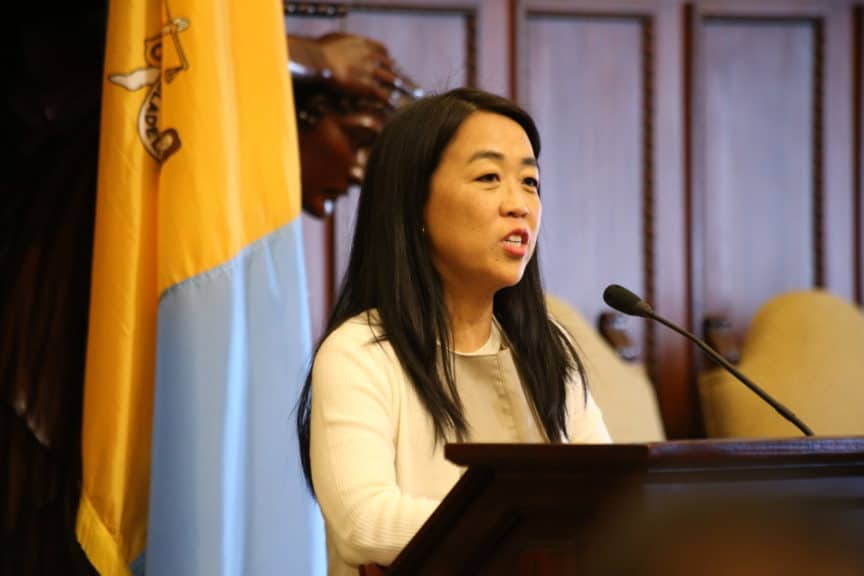Philadelphia has reduced evictions by 75% in one of the highest evicting cities in the nation
PHILADELPHIA — Today, Philadelphia City Council unanimously voted to approve Councilmember Helen Gym’s legislation establishing local authorization for Philadelphia’s nationally acclaimed eviction diversion program, moving the program out of emergency status and into the City code. Philadelphia’s program, which has received praise from the White House and Department of Justice, has a 93 percent success rate in avoiding evictions. It has been adopted by municipalities across the country and is credited with helping prevent thousands of evictions and COVID cases.
Philadelphia’s eviction diversion program currently mandates that landlords must seek mediation with trained housing counselors and apply for rent assistance before being able to file for an eviction. Philadelphia was the most efficient county in the country in disbursing over $200 million in rent assistance to almost 40,000 families, in part due to the diversion mandate on rent assistance filing.
“Philadelphia’s eviction prevention work is the most successful in the country, helping reduce evictions by 75 percent two years in a row in one of the highest evicting cities in the nation,” said Councilmember Helen Gym (At-Large). “This work has brought stability to families amidst a public health crisis, especially as the economy bottomed out and left thousands of Philadelphians struggling financially. If the poorest large city in the nation can help prevent poverty-based evictions, then any city can.”
Pre-pandemic, Philadelphia ranked as the fourth highest evicting city in the nation, processing 20,000 evictions annually. In 2020, Philadelphia processed less than 4,500 evictions, and in 2021 the number is expected to be around 6,000 eviction filings.
Local data showed that 74% of evictions involved a Black tenant, 70% involved a woman, and half involved a parent or caretaker. Councilmember Gym has been a leading voice in the effort to end the scourge of evictions, establishing a Tenant Legal Defense Fund, an anti-Eviction Task Force, and launching the Philadelphia Eviction Prevention Project which offers a tenant help hotline and guarantees legal representation in landlord-tenant court for low-income tenants. In 2020, Councilmember Gym led an aggressive package of protections, including a temporary eviction moratorium, mandatory pre-filing eviction diversion, and mediation with trained housing counselors for landlords and tenants. Two national studies credited the city’s legislative efforts with preventing upwards of 50,000 cases of COVID-19.
Gym said that eviction diversion is a critical piece in her broader work to end evictions in Philadelphia.
“In 2022, we are going to dig even deeper, launching our Right to Counsel law in targeted zip codes and ensuring that the housing counselors we funded through 2024 can continue assisting individuals facing foreclosure as well as renters who might face eviction, “ Councilmember Gym said. “We always knew that the COVID pandemic exposed existing crises, and I’m proud that Philadelphia is so focused on fixing a crisis of evictions by giving landlords and tenants alternatives and ensuring that evictions are a means of last resort, rather than the default option.”
“Evictions are most likely to impact Black, female-led households—so addressing Philadelphia’s eviction crisis is absolutely a matter of racial and economic justice,” said Councilmember Jamie Gauthier (District 3). “The Eviction Diversion Program has quickly become a national model, and I am proud that Philadelphia will remain at the forefront of this vital work to keep renters safely and stably housed. I’m so grateful to Councilmember Gym for her leadership on this issue, and for her partnership on the Emergency Housing Protection Act, which protected the housing of vulnerable Philadelphians during the most uncertain and challenging months of the pandemic.”
“Pre-pandemic, Philadelphia’s dangerously high eviction rate displaced thousands of renters each year, with Black women bearing the brunt of it,” said Councilmember Kendra Brooks (At-Large). “Eviction diversion showed the nation that there is a more humane, more just alternative to mass evictions—one that benefits both landlords and tenants alike. With this program, Philly is demonstrating that we can lead on smart and equitable housing policy, and that the most severe responses to landlord-tenant disputes don’t have to be our primary way of dealing with conflict. I applaud Councilmember Gym’s dedication to growing this lifesaving policy into a long-term solution to the housing crisis.”
“This program brings fairness to a system that has been stacked against renters like myself for too long,” said Shirlene Murray, life-long Philadelphian and small business owner. “Prior to the creation of this program, I was forced to move from my home because my landlord refused to make critical repairs and address mold within my home. The mediation process within the eviction diversion program will ensure renters are no longer vulnerable to the threat of eviction for raising issues like these, and landlords will be held accountable to quickly repair substandard homes.”
“As Philadelphia communities change, the Eviction Diversion program is critical in ensuring that communities remain inclusive of all races, ethnicities, and economic levels; that contributes to the strength and vitality of Philadelphia’s neighborhoods,” said Anabeth Rosado, Certified Housing Counselor at United Communities of Southeast Philadelphia. “The mediation program is an opportunity for tenants to work through their crisis via communicating with the landlord and seeking other program assistance, such as Utility Assistance, Community Programming, and access to Benefits via the Benephilly program. As a Housing Counselor, the Eviction Diversion program has shown me that tenants and landlords are committed to resolving differences and coming together for a resolution to address back rent owed, repair issues, and other concerns.”
###


